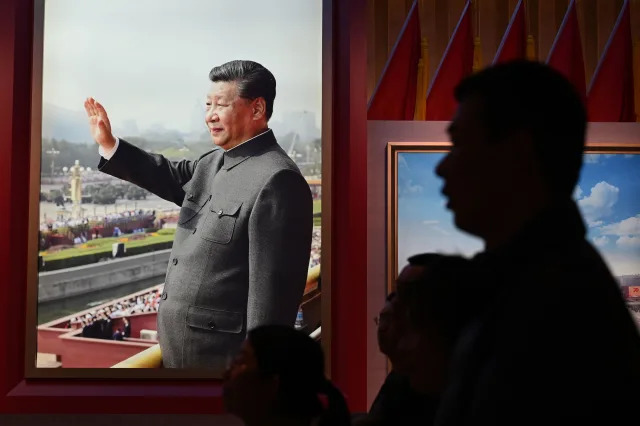https://sg.yahoo.com/news/china-challenged-100-storm-205810921.html
Sat, 30 March 2024 at 4:58 am SGT21-min read

People look at an exhibition featuring Chinese President Xi Jinping at the Military Museum in Beijing on March 3, 2024. Credit - Greg Baker—AFP/Getty Images
A few years ago, President Xi Jinping started warning that a 100-year big storm is coming. As is typical of the early days of a hurricane, one can now feel it. The circumstances and the mood in China have indisputably changed to become more threatening. These changes are mostly due to big cycle forces.
The most joyous and productive environments are ones that have freedom, civility, and creativity, and ones in which people can make their dreams into great realities with prosperity that is shared by most people.
This happened in China from around 1980 until around five years ago. It is quite typical for such booms to produce debt bubbles and big wealth gaps that lead the booms to turn into bubbles that turn into busts.
That happened in China at the same time as the global great power conflict intensified, so China is now in the post-bubble and great power conflict part of the Big Cycle that is driven by the five big forces that have changed the mood and the environment.
In this piece, I will first describe in brief how the Big Cycle has transpired over roughly the past century, and then I will explain the current picture of what is happening today, with a focus on the challenges that China is facing.
This history and these dynamics are complex and important to world history and the global order—everything I write here is how I see it based on my own experience, relationships, and research
How China Will Be Challenged By a 100-Year Storm
Ray DalioSat, 30 March 2024 at 4:58 am SGT21-min read

People look at an exhibition featuring Chinese President Xi Jinping at the Military Museum in Beijing on March 3, 2024. Credit - Greg Baker—AFP/Getty Images
A few years ago, President Xi Jinping started warning that a 100-year big storm is coming. As is typical of the early days of a hurricane, one can now feel it. The circumstances and the mood in China have indisputably changed to become more threatening. These changes are mostly due to big cycle forces.
The most joyous and productive environments are ones that have freedom, civility, and creativity, and ones in which people can make their dreams into great realities with prosperity that is shared by most people.
This happened in China from around 1980 until around five years ago. It is quite typical for such booms to produce debt bubbles and big wealth gaps that lead the booms to turn into bubbles that turn into busts.
That happened in China at the same time as the global great power conflict intensified, so China is now in the post-bubble and great power conflict part of the Big Cycle that is driven by the five big forces that have changed the mood and the environment.
In this piece, I will first describe in brief how the Big Cycle has transpired over roughly the past century, and then I will explain the current picture of what is happening today, with a focus on the challenges that China is facing.
This history and these dynamics are complex and important to world history and the global order—everything I write here is how I see it based on my own experience, relationships, and research


